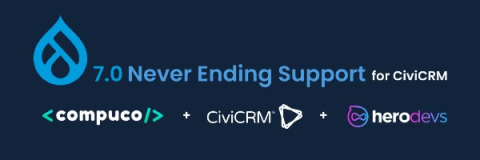
So, you're running CiviCRM on Drupal 7?
This is great. It's the CMS with 7 lives. It never dies. Except, as they say, all good things must come to an end (one day). And, it seems, that Drupal 7 finally has finally, sorta, reached its end of life.
There is good news!
For starters, no matter what you think of D7 (or any of the options we list below), you can find someone who agrees with you. And, best of all, regardless of your choice, CiviCRM can go with you! Of course, in all cases you have a global network of partners at your disposal to help.
"Drupal-based" Options
The following 3 options keep you in the ballpark of the Drupal environment and will be perhaps the most familiar to you.

Drupal 10+
Drupal has become a more sophisticated system. It has powerful tools like `composer` that warn about more problems upfront. CiviCRM works just as well in Drupal 8, 9, and 10 as it did in 7. You will have to convert your Drupal data, but the CiviCRM data will transfer over cleanly.
- Ideal for medium to large organizations with complex needs and powerful customizations
- More of a migration than an upgrade, this is a full on project
- Supported by several partners
- Can be costly depending on your existing set up

Backdrop
Backdrop is a fork of D7 that has been gaining popularity. CiviCRM works equally well on it as it does Drupal 7 and, for many, the combination of Backdrop with CiviCRM will feel almost like home. Here's a good overview of Backdrop as an option.
- Ideal for small to medium organizations that want to remain on Drupal 7 without, errr, remaining on Drupal 7.
- Can be used equally well for large complex sites.
- Viewed more as an upgrade than a full on migration.
- Less expensive than other options.
- Supported by several partners.

Drupal 7 NES
Ok, you’re in love with Drupal 7. We get it. You want to get as much value out of your set up as you can. You’re in luck. There is now an option that extends your potential use of Drupal 7 beyond the stated end of life; Never Ending Support.
- Ideal for organizations that want to stay on Drupal 7 or want extra time to decide about one of the other options, and want a high level of confidence that it will remain stable and secure
- No migration, no upgrade, just keep on trucking!
- Cost effective
- Offered by Compuco
Alternatives to Drupal (in general)
The following 3 options take you out of the Drupal ecosystem entirely, giving you different options, costs, etc. It's a whole new world!

WordPress
WordPress has grown in popularity throughout the CiviCRM ecosystem, and for good reason; it's close to parity with Drupal given new integrations with form buildering and views-oriented tools. WordPress also ships with an incredible ecosystem of plugins that can add new capabilities essentially at the click of a button.
- Ideal for organizations of all sizes that can adapt their workflows and processes to a new CMS.
- A full on migration to a new platform.
- Huge ecosystem of plugins.
- Can be cost effective and easier to support.
- Supported by several partners.

Joomla!
Joomla! continues to be a solid CMS with a powerful and compelling feature set and a passionate community. It leads the pack in privacy focused features, adoption of web standards, and support for multilingual content. Stable and highly scalable, Joomla! is a better option today than it's ever been!
- Ideal for organizations of all sizes that can adapt their workflows and processes to a new CMS.
- A full on migration to a new platform.
- Ideal for high content and multilingual sites.
- Can be cost effective and easier to support.
- Supported by several partners.

CiviCRM
You may have continued using Drupal 7 because you just don't want to make a new commitment to any CMS. Clearly, there's a risk. But if you don't need an of the supported CMS's, that's OK. You can still use CiviCRM as your CRM. (Re)Introducing CiviCRM Standalone!
- Ideal for organizations of all sizes that do not leverage the benefits of CiviCRM’s integration with a CMS.
- Reduces technical complexity.
- Easy, cost effective migration.
- Requires you to maintain a website separately from your CRM (if you want a website at all!)
Please note that there may be other options out there that we simply have not curated. Our objective in presenting these is to cover those that we feel offer the most potential benefits for you.

